Guide to Being Pregnant While Working

Working while pregnant is an undeniable reality for many American women. Over 80 percent of pregnant women in the U.S. work in the final month of their pregnancy, according to the Pew Research Center – a significant increase from decades before. But even though working while pregnant has become common practice, a shocking number of women are hiding their pregnancies from their bosses and co-workers.
To learn more about societal attitudes toward pregnancy in the U.S., we surveyed 304 women who are currently or have previously worked while pregnant and 700 people who have worked alongside or supervised a pregnant employee. Nearly 40 percent of the women surveyed initially kept their pregnancy a secret while on the job. Although prejudice and discrimination toward pregnant women seems off-limits, our survey suggests that attitudes toward working, expectant mothers are far from ideal.
Read on to discover the factors, good and bad, faced by women who work while pregnant.
Being Pregnant at Work
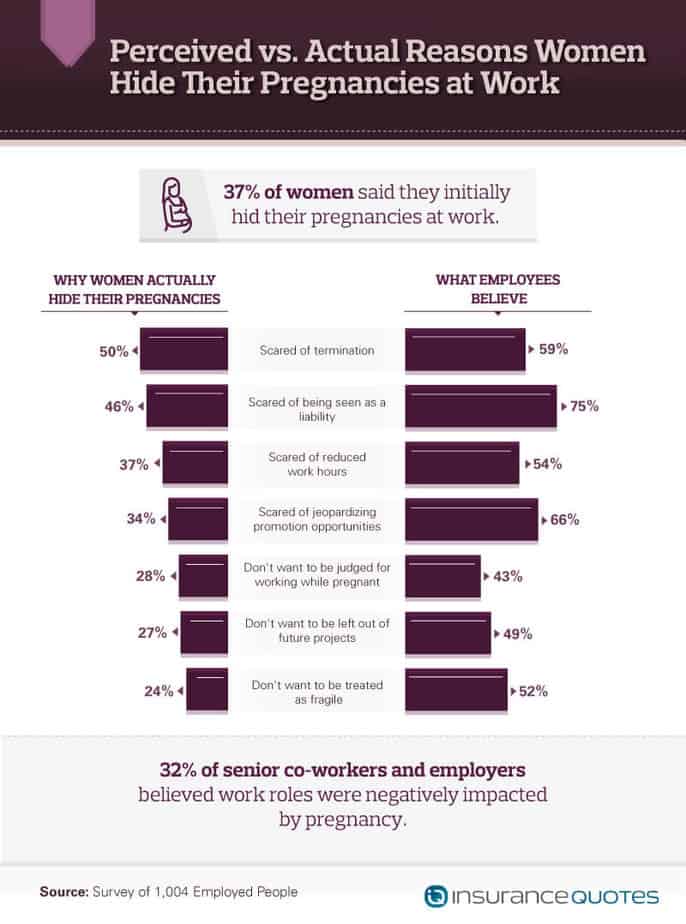
The federal government passed The Pregnancy Discrimination Act (PDA), which makes it illegal to factor a woman’s pregnancy into hiring, firing, pay, job assignments, layoffs, promotions, or any other term of employment. However, our survey suggests many pregnant women are still concerned about discrimination in the workplace. In fact, 50 percent of women said they hid their pregnancy because they were worried it would get them fired.
Of the 37 percent of women who said they initially hid their pregnancy at work, the top reasons included fear of being fired (50 percent) or being seen as a liability (46 percent), fear of having one’s hours cut (37 percent), and fear of losing promotion opportunities (34 percent). Although coverage for maternity care is covered in The Pregnancy Discrimination Act, smaller companies are not required to comply.
Our results suggest that despite being protected by law, pregnant workers probably have good reason to be concerned about their benefits and opportunities under their employers.
Pregnancy Details Disclosed
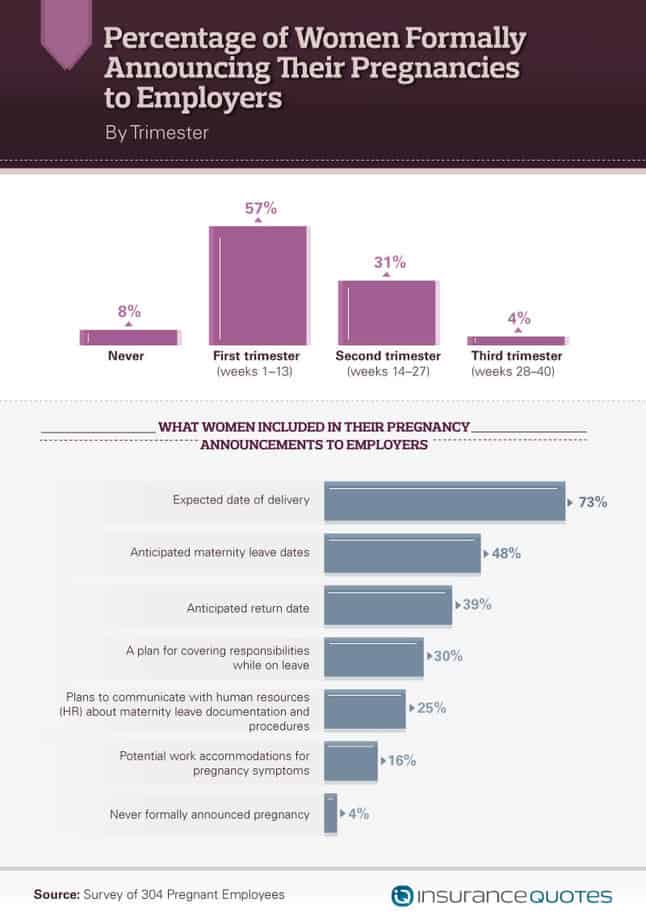
Although many workers fear judgment and discrimination, informing employers about pregnancy and potential maternity leave is almost inevitable. To understand how people navigate this difficult situation, we asked survey respondents what (and when) they communicated to their employers.
Fifty-seven percent of respondents informed their employers about their pregnancy in the first trimester. Thirty-one percent let them know in the second trimester (from weeks 14 to 27), and 8 percent never formally told their employers at all. Nevertheless, the disclosed details varied among workers who did let their boss or HR department know.
Based on our data, much of pregnant employees’ focus seemed to be on the workplace’s needs as opposed to their own. Seventy-three percent of respondents included their expected date of delivery in the announcement, 48 percent included their anticipated maternity leave dates, and 39 percent included a rough estimate of when they anticipated returning to work.
Thirty percent even provided a plan for how their employer could cover their responsibilities in their absence. Only 16 percent of participants brought up the accommodations they’d need to cope with pregnancy symptoms at work.
Asking for Accommodations
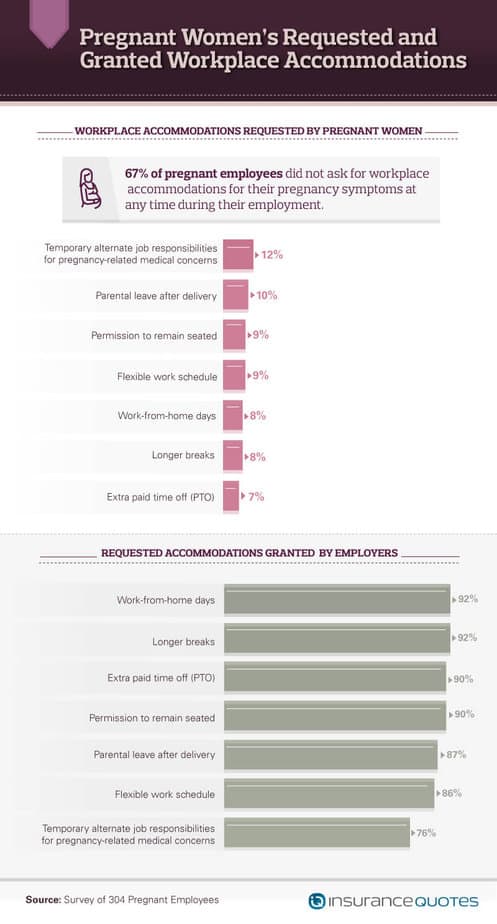
The U.S. does not guarantee paid maternity leave. Moreover, the number of women who take maternity leave, paid or unpaid, has not increased in the last two decades.
To get a better understanding of the workplace benefits and accommodations pregnant employees are receiving, we asked survey participants about the adjustments they requested versus the ones they actually received. Twelve percent of respondents asked for alternate job responsibilities and even less asked for other accommodations, such as parental leave after delivery, a more flexible work schedule, work-from-home days, longer breaks, or extra paid time off. The silver lining: More than three-quarters of participants who asked for these accommodations ended up receiving them.
In other words, our survey results imply that pregnant employees are asking for very little adjustments in the workplace – but that employers generally grant these rare requests.
Read the Room
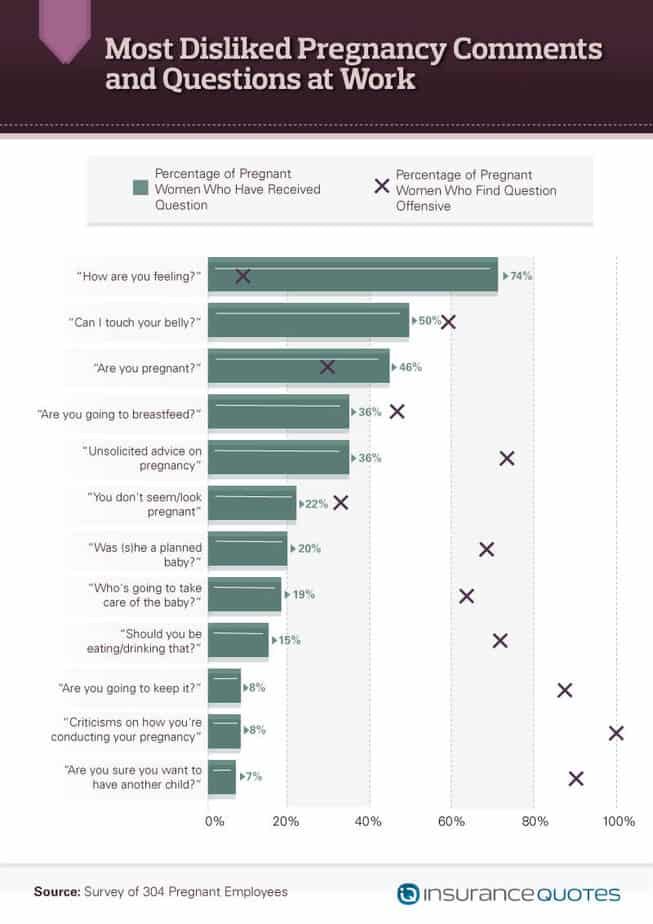
Being pregnant on the job may provoke a lot of comments from customers and co-workers alike, and conversational missteps are surprisingly common. We asked survey participants about the questions and remarks they commonly received – and the ones that annoyed them most.
Co-workers, take note: Unsolicited pregnancy advice and requests to touch a pregnant employee’s belly were among the most disliked moments, and they were also relatively common. Other unappreciated questions included asking if the baby was planned and whether the mother would breastfeed. The most common question was “How are you feeling?” but only a small portion of survey respondents (around 10 percent) found it offensive.
Gender and Job Levels
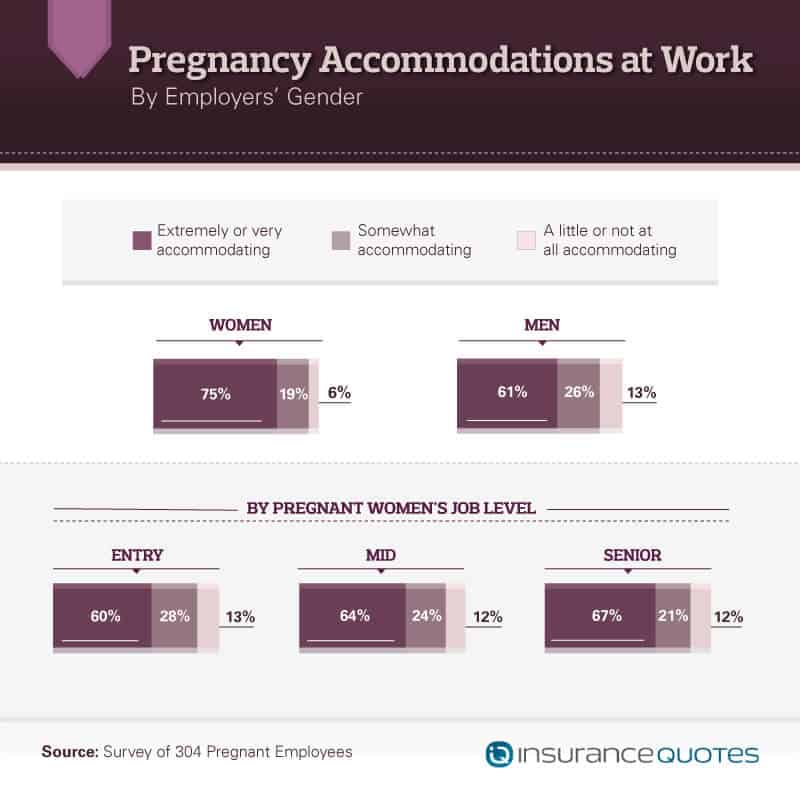
Experiences in the workplace likely vary depending on the gender of a pregnant employee’s boss. Our results suggest female bosses were 23 percent more accommodating than male bosses, on average, when it came to granting pregnant workers flexibility or other maternity benefits. Nevertheless, 61 percent of respondents found their male employers to be “extremely or very accommodating” – and there was not a sizeable difference in experience between entry-level, mid-level, and senior-level pregnant employees.
Gains and Losses
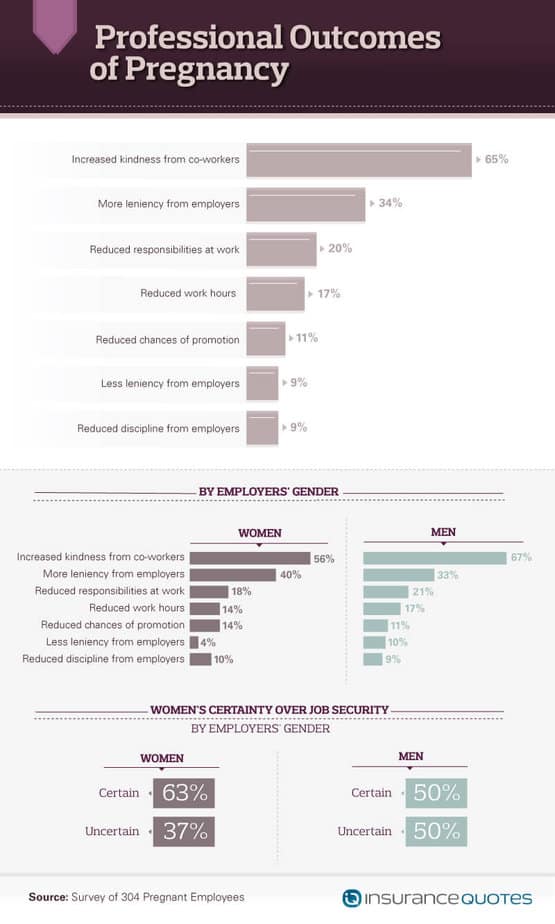
To understand how pregnant women are treated in the workplace, we asked participants about the advantages and disadvantages they experienced. Many women experienced kindness and flexibility from their co-workers, and 20 percent said their responsibilities were reduced. Meanwhile, 17 percent said their hours were reduced, and 11 percent reported experiencing a reduced chance of promotion. When it came to job security, women with female bosses felt more certain (63 percent) than women who had male bosses (50 percent).
Despite feeling increased kindness and leniency, over half of pregnant women in the workforce felt unsure about whether or not they would be able to return to their job.
Time Off for Baby
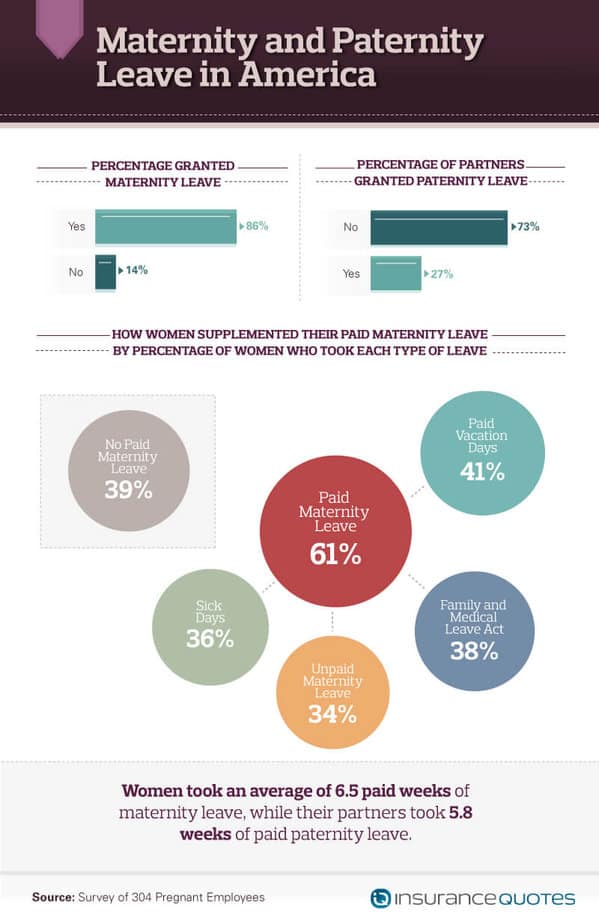
In the U.K., pregnant workers are entitled to one year of maternity leave, 12 weeks of which are paid in full. In Bulgaria, mothers get nearly 46 fully paid weeks off. But women in the U.S. – the “least generous member” of the Organization for Economic Cooperation and Development (OECD) – receive no guaranteed leave at all after giving birth. Individual company policies determine to what workers are entitled. For that reason, we asked workers how much time off they actually got after giving birth.
Our results suggest that even though 86 percent of women were granted maternity leave, 61 percent of women received paid maternity leave. However, those who took this leave also combined it with other benefits such as paid vacation days, sick days, unpaid maternity leave, and FMLA benefits to cobble together more time for childbirth and care. Though there are a few resources to help women navigate birth and work, or any complications at birth that may inhibit returning to work as planned, benefits such as FMLA do not provide pay for the time taken, simply job security upon return.
At the same time, 73 percent of partners received no leave to support their spouse and new child. Unfortunately, many Americans don’t get time off after welcoming a new child into their household.
Challenges of Pregnancy at Work
Our survey indicates with overwhelming detail that being pregnant in the workforce is not easy – in fact, pregnant workers fear it will be a significant disadvantage to their careers. Women who work while pregnant fear losing job promotions, hours, key projects and even their employment. Meanwhile, pregnant employees often have to deal with invasive questions in the workplace, and only a small percentage asks for work accommodations while pregnant. According to our study, working and managing your pregnancy takes some planning, and it’s worthwhile to ask for help and use the resources available. Visit insuranceQuotes.com to learn more about navigating pregnancy, family planning, and career building.
Methodology and Limitations
We surveyed 304 women who have experienced being pregnant at work. In a supplementary survey, we gathered data from 700 people who have had the experience of working alongside or supervising an employee who was pregnant at the time. We only surveyed women who were employed (either full or part time) and excluded those who took leave during the entirety of their pregnancy, were self-employed and not receiving benefits, and unemployed. The average age of our survey participants was 37 with a standard deviation of 7 years. Ages ranged from 20 to 72. These data are an exploratory examination of maternity leave in America, and hypotheses were not statistically tested. Survey studies are subject to certain limitations such as telescoping and selective memory.
Sources
https://money.cnn.com/2018/01/19/news/economy/countries-most-maternity-leave/index.html
https://www.cbsnews.com/news/number-of-u-s-women-taking-maternity-leave-unchanged-for-two-decades/
https://www.eeoc.gov/eeoc/publications/fs-preg.cfm
Fair Use Statement
Are you planning your pregnancy or know someone who is? Please share our study for noncommercial purposes only with aspiring moms and dads in the workforce. We only ask that you link back to our study to give us credit for our work.
